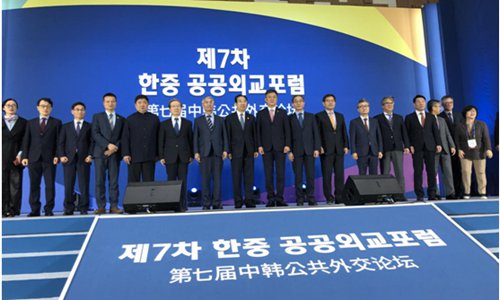What affects everlasting peace in East Asia?

Participants take a group photo at the 7th China-ROK Public Diplomacy Forum on October 17. Photo: huanqiu.com
I attended the 7th China-ROK Public Diplomacy Forum held from October 16 to 18 in Incheon, South Korea. The theme of the first session focused on peace and cooperation in Northeast Asia. During the tea break, a member of the South Korean audience walked up to me and asked very inquisitively: "Can you [China] defeat the US?"
What he was referring to is the trade war. I replied that first it is not an issue about victory or defeat. Second, China is not trying to defeat the US, which is not capable of vanquishing China.
The look in his eyes said he was unwilling to believe Beijing could stand up to the pressure from Washington. This person's question brought to the fore two points - one is that China-US rivalry is a zero-sum game over who will have the final say in Asia; the other one is that South Koreans still contend the US is more powerful.
Such a strong notion was evident in the discussion. I proposed that East Asian countries need to explore how to gradually establish a new security framework by cooperation in trade and economy, in an attempt to avoid falling into a security dilemma influenced by outside forces.
A South Korean scholar clearly did not agree with me. He argued that the North Korea issue can only be resolved by relying on the US and encouraging communication and reconciliation between Washington and Pyongyang. My interactions with South Korean scholars show that a majority of them hold such a view. They are tirelessly working to seek a solution to the issue within existing mechanisms.
It is time we question the current security structure. For how many years have we been dependent on it? Have the problems been tackled? Have the problems moved toward a solution or worsened? The answers can only be found within the current structure.
Despite the demise of the Cold War, the security architecture from the time has remained and there is no sign of a new structure coming to replace it. At least South Korea and Japan are still US military allies. Some bitterness and rift due to the Cold War are still there, and these issues have manifested themselves in division of the Korean Peninsula and the unrealized reunification of China.
The military alliance formed by the US, South Korea and Japan still has a clear target - North Korea. South Korean wartime operational command is still in the hands of Americans. In recent years, it has become increasingly apparent that due to change in US policies, this alliance has stepped up military coordination and deployment against China and Russia. We can see that from the deployment of the Terminal High Altitude Area Defense (THAAD) system in South Korea in 2017.
It is fair to say that the existing insecurity among relevant parties is fundamentally related to this structure, but the increased insecurity at the same time has reinforced the current security structure.
Therefore, it is necessary to change the existing structure so as to augment the sense of security and mutual trust of all parties. However, this may eventually lead to a collapse of US-led regional military alliance, which then would not be necessary any more. The US won't be happy to see that happen. Besides, it may also not be an appealing outcome for Japan and South Korea as the two countries are showing increasing dependence on the US at the moment.
Kim Ki-jung, professor of political science and international relations at Seoul's Yonsei University, expounded his points of view in relation to Europe. He thought that after WWII, Europe has found a path to sustained peace and resolved the problems of war and peace.
Most scholars in East Asia would like to compare the status quo of this region with Europe. This comparison is not wrong, but what is more important is to figure out what exactly is needed in East Asia.
Obviously, what lacks in East Asia is a new system of cooperation, or at least something like the economic or trade cooperation mechanism of the European Community in the bloc's early years. This is the real dilemma East Asia is in.
The author is a senior editor with People's Daily, and currently a senior fellow with the Chongyang Institute for Financial Studies at Renmin University of China. dinggang@globaltimes.com.cn. Follow him on Twitter @dinggangchina


